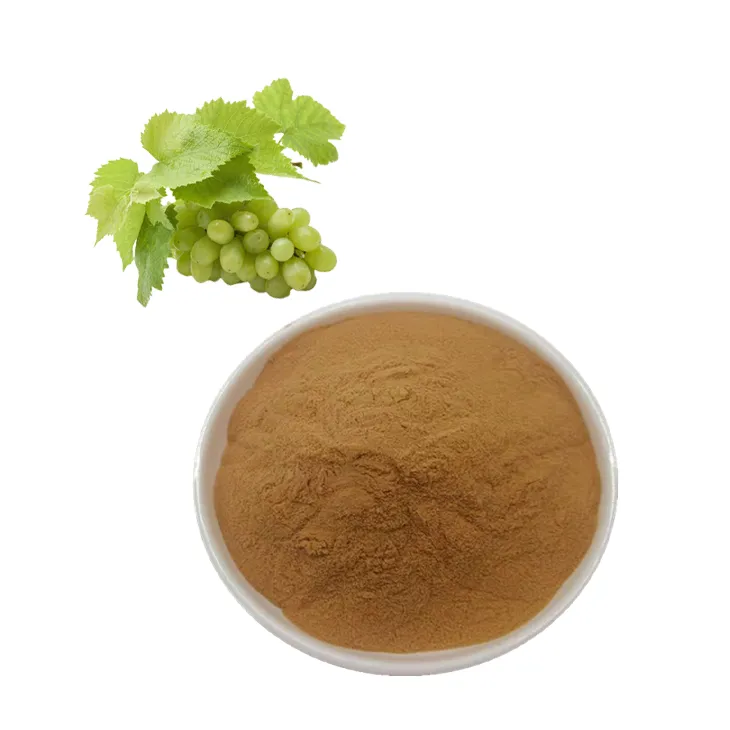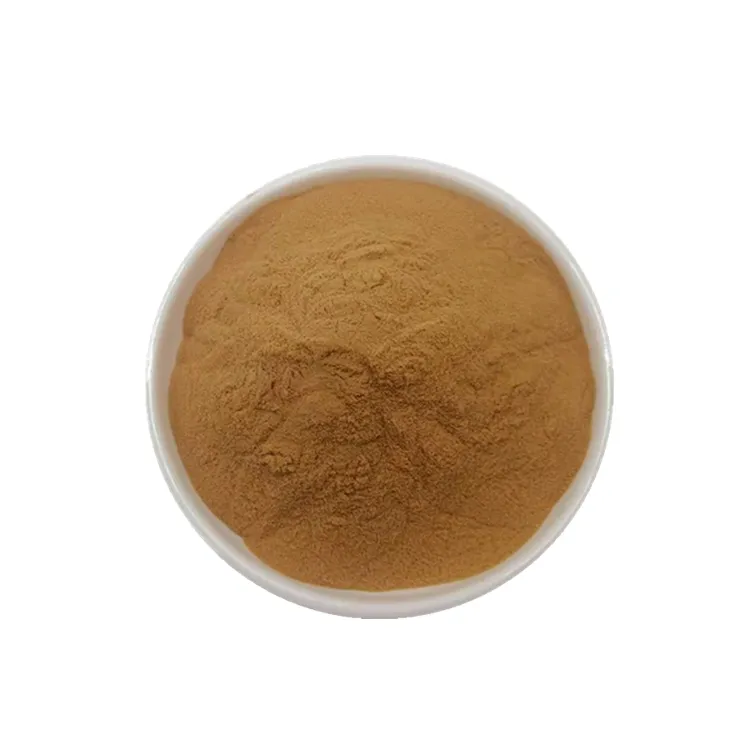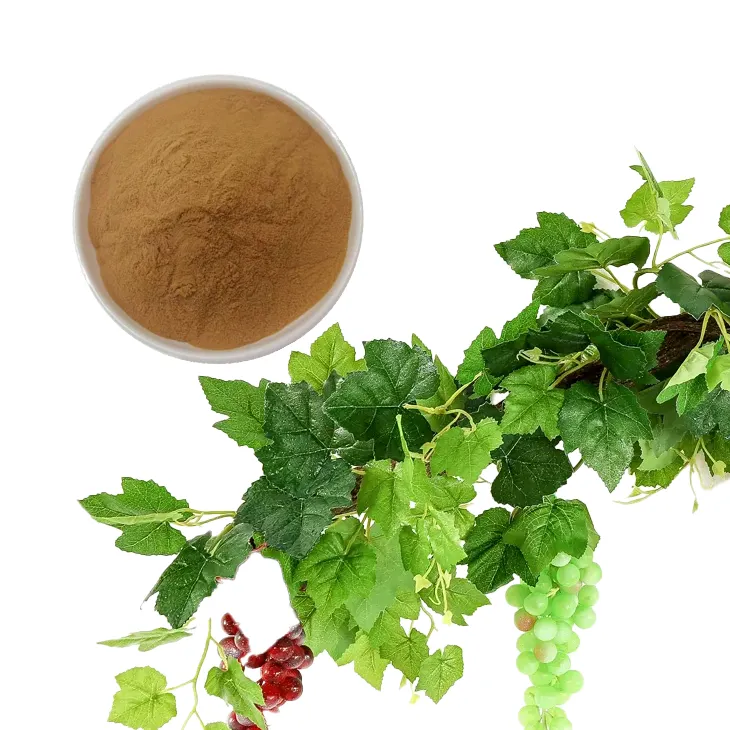- 0086-571-85302990
- sales@greenskybio.com
Which Grape Leaf Extract Should You Use?
2024-12-18

1. Introduction to Grape Leaf Extracts
Grape Leaf Extracts have been gaining popularity in recent years, both in the fields of dietary supplements and natural remedies. These extracts are derived from the leaves of grapevines, which are rich in various bioactive compounds. The general benefits of Grape Leaf Extracts are numerous and far - reaching, making them an interesting option for those looking to enhance their health.

2. General Benefits of Grape Leaf Extracts
2.1 Anti - Inflammatory Properties
Inflammation is a natural response of the body's immune system to injury or infection. However, chronic inflammation can lead to a variety of health problems, such as heart disease, arthritis, and certain cancers. Grape leaf extracts have been shown to possess anti - inflammatory properties. This means that they can help to reduce inflammation in the body, potentially alleviating symptoms associated with inflammatory conditions.
2.2 Immune - Boosting Effects
The immune system is our body's defense against harmful pathogens. A strong immune system is essential for good health. Grape leaf extracts are believed to have immune - boosting effects. They can stimulate the immune system, making it more efficient at fighting off infections. This is likely due to the presence of certain bioactive compounds in the extracts that interact with the immune cells in a positive way.

3. Chemical Composition of Grape Leaf Extracts
3.1 Phenolic Compounds
One of the important aspects of grape leaf extracts is their phenolic compound content. Phenolic compounds are known for their antioxidant properties. Some grape leaf extracts may have higher levels of phenolic compounds compared to others. These phenolic compounds play a crucial role in the antioxidant defense of the body. They can scavenge free radicals, which are unstable molecules that can cause damage to cells and DNA. By neutralizing free radicals, phenolic compounds help to protect the body from oxidative stress, which is associated with various diseases and aging.
3.2 Other Bioactive Compounds
In addition to phenolic compounds, grape leaf extracts also contain other bioactive compounds. These may include flavonoids, tannins, and saponins. Flavonoids are a type of polyphenol that has been shown to have various health benefits, such as anti - inflammatory, antioxidant, and anti - cancer properties. Tannins are known for their astringent properties and may also have antioxidant and anti - microbial effects. Saponins are glycosides that can have cholesterol - lowering and anti - inflammatory effects.

4. The Impact of the Extraction Process
4.1 Different Extraction Methods
There are several extraction methods used to obtain grape leaf extracts. These include solvent extraction, supercritical fluid extraction, and microwave - assisted extraction. Each extraction method has its own advantages and disadvantages in terms of the quality and efficacy of the extract obtained.
-
Solvent extraction is a common method. It involves using a solvent, such as ethanol or methanol, to dissolve the bioactive compounds from the grape leaves. However, this method may leave behind some solvent residues, which could be a concern if not properly removed.
-
Supercritical fluid extraction uses supercritical carbon dioxide as the solvent. This method is considered more "green" as carbon dioxide is non - toxic and easily removed. It can also produce extracts with a high concentration of bioactive compounds.
-
Microwave - assisted extraction is a relatively new method. It uses microwave energy to speed up the extraction process. This method can be more efficient in terms of time and may also preserve the bioactivity of the compounds better.
4.2 Quality and Efficacy
The extraction process can significantly affect the quality and efficacy of the grape leaf extract. A well - executed extraction process can ensure that the extract contains a high concentration of the desired bioactive compounds while minimizing the presence of unwanted substances. For example, if the extraction temperature or time is not properly controlled, it could lead to the degradation of some bioactive compounds, reducing the effectiveness of the extract. On the other hand, a proper extraction process can enhance the bioavailability of the compounds in the extract, making them more easily absorbed by the body.
5. Considerations for Dietary Supplements
5.1 Standardization
When choosing a grape leaf extract for use as a dietary supplement, standardization is an important factor to consider. Standardization ensures that the extract contains a consistent amount of the active ingredients. This is crucial for ensuring the effectiveness and safety of the supplement. For example, if a supplement claims to contain a certain amount of phenolic compounds, standardization can help to verify that claim.
5.2 Safety and Side Effects
Although grape leaf extracts are generally considered safe, there may be some potential side effects, especially when taken in large doses. Some people may experience digestive issues, such as nausea or diarrhea. It is also important to note that grape leaf extracts may interact with certain medications. For example, they may enhance the effects of blood - thinning medications. Therefore, it is advisable to consult a healthcare professional before starting to take a grape leaf extract supplement.
6. Grape Leaf Extracts for Natural Remedies
6.1 Traditional Uses
Grape leaf extracts have a long history of use in traditional medicine. In some cultures, they have been used to treat conditions such as diarrhea, wounds, and skin infections. The anti - inflammatory and antimicrobial properties of the extracts may contribute to their effectiveness in these traditional uses.
6.2 Modern Applications
In modern times, grape leaf extracts are being explored for their potential in treating more complex health conditions. For example, some research is looking at their role in managing diabetes and cardiovascular diseases. The antioxidant and anti - inflammatory properties of the extracts may be beneficial in these contexts.
7. How to Choose the Right Grape Leaf Extract
7.1 Identify Your Needs
Before choosing a grape leaf extract, it is important to identify your specific needs. Are you looking for an immune - booster, an anti - inflammatory agent, or something else? If you are interested in using it for a particular health condition, such as diabetes or heart disease, you may want to look for extracts that have been studied for their effectiveness in that area.
7.2 Check the Label
When purchasing a grape leaf extract product, always check the label carefully. Look for information on the extraction method, the content of bioactive compounds, and any certifications or quality control measures. A product that is transparent about its production process and ingredients is more likely to be of high quality.
7.3 Consider the Brand Reputation
The reputation of the brand is also an important factor. Choose a brand that has a good track record in terms of product quality and customer satisfaction. You can read reviews from other consumers or look for information from reliable sources, such as consumer watchdog organizations.
8. Conclusion
Grape leaf extracts offer a range of potential health benefits, thanks to their anti - inflammatory, immune - boosting, and antioxidant properties. However, when choosing a grape leaf extract, it is important to consider factors such as its chemical composition, the extraction process, and your specific needs. Whether for use as a dietary supplement or a natural remedy, taking the time to research and select the right grape leaf extract can help you make the most of its potential health - promoting properties.
FAQ:
What are the main benefits of grape leaf extracts?
Grape leaf extracts have various benefits. They possess anti - inflammatory properties which can help in reducing inflammation in the body. Also, they have immune - boosting capabilities, strengthening the body's immune system. Additionally, some grape leaf extracts with high levels of phenolic compounds are great for antioxidant defense, protecting the body from oxidative stress.
How does the chemical composition of grape leaf extracts vary?
The chemical composition of grape leaf extracts can vary. Some extracts may have higher levels of phenolic compounds. These phenolic compounds play a significant role in antioxidant activities. Other components may also differ in quantity and type, which can influence the overall properties and potential benefits of the extract.
What is the impact of the extraction process on grape leaf extracts?
The extraction process has a crucial impact on the quality and efficacy of grape leaf extracts. Different extraction methods can result in different concentrations of active compounds. For example, a well - optimized extraction process can ensure a higher yield of beneficial compounds like phenolic compounds. A poor extraction process may lead to a lower - quality extract with less - effective properties.
Can grape leaf extracts be used as dietary supplements?
Yes, grape leaf extracts can be used as dietary supplements. Due to their various beneficial properties such as anti - inflammatory, immune - boosting, and antioxidant properties, they can be a valuable addition to a diet. However, it is important to ensure that the supplements are sourced from reliable manufacturers and are used in accordance with recommended dosages.
How can grape leaf extracts be used as natural remedies?
Grape leaf extracts can be used as natural remedies in several ways. Their anti - inflammatory properties may help in alleviating certain inflammatory conditions. For skin - related issues, they may be applied topically (if formulated appropriately) to potentially reduce inflammation. Internally, they can be consumed in the form of supplements or teas to support the immune system and antioxidant defense.
Related literature
- The Chemical Composition and Bioactivity of Grape Leaf Extracts"
- "Grape Leaf Extract: From Traditional Use to Modern Dietary Supplements"
- "Impact of Extraction Methods on the Quality of Grape Leaf Extracts"
- ▶ Hesperidin
- ▶ Citrus Bioflavonoids
- ▶ Plant Extract
- ▶ lycopene
- ▶ Diosmin
- ▶ Grape seed extract
- ▶ Sea buckthorn Juice Powder
- ▶ Fruit Juice Powder
- ▶ Hops Extract
- ▶ Artichoke Extract
- ▶ Mushroom extract
- ▶ Astaxanthin
- ▶ Green Tea Extract
- ▶ Curcumin
- ▶ Horse Chestnut Extract
- ▶ Other Product
- ▶ Boswellia Serrata Extract
- ▶ Resveratrol
- ▶ Marigold Extract
- ▶ Grape Leaf Extract
- ▶ New Product
- ▶ Aminolevulinic acid
- ▶ Cranberry Extract
- ▶ Red Yeast Rice
- ▶ Red Wine Extract
-
Giant Knotweed Extract
2024-12-18
-
Grapefruit Seed Extract Powder
2024-12-18
-
Okra Extract
2024-12-18
-
Kelp Extract Powder
2024-12-18
-
Kidney Bean Extract
2024-12-18
-
Bitter Melon Extract
2024-12-18
-
Natural grape seed extract
2024-12-18
-
Scutellaria Extract
2024-12-18
-
Astaxanthin
2024-12-18
-
Tongkat Ali Extract
2024-12-18





















